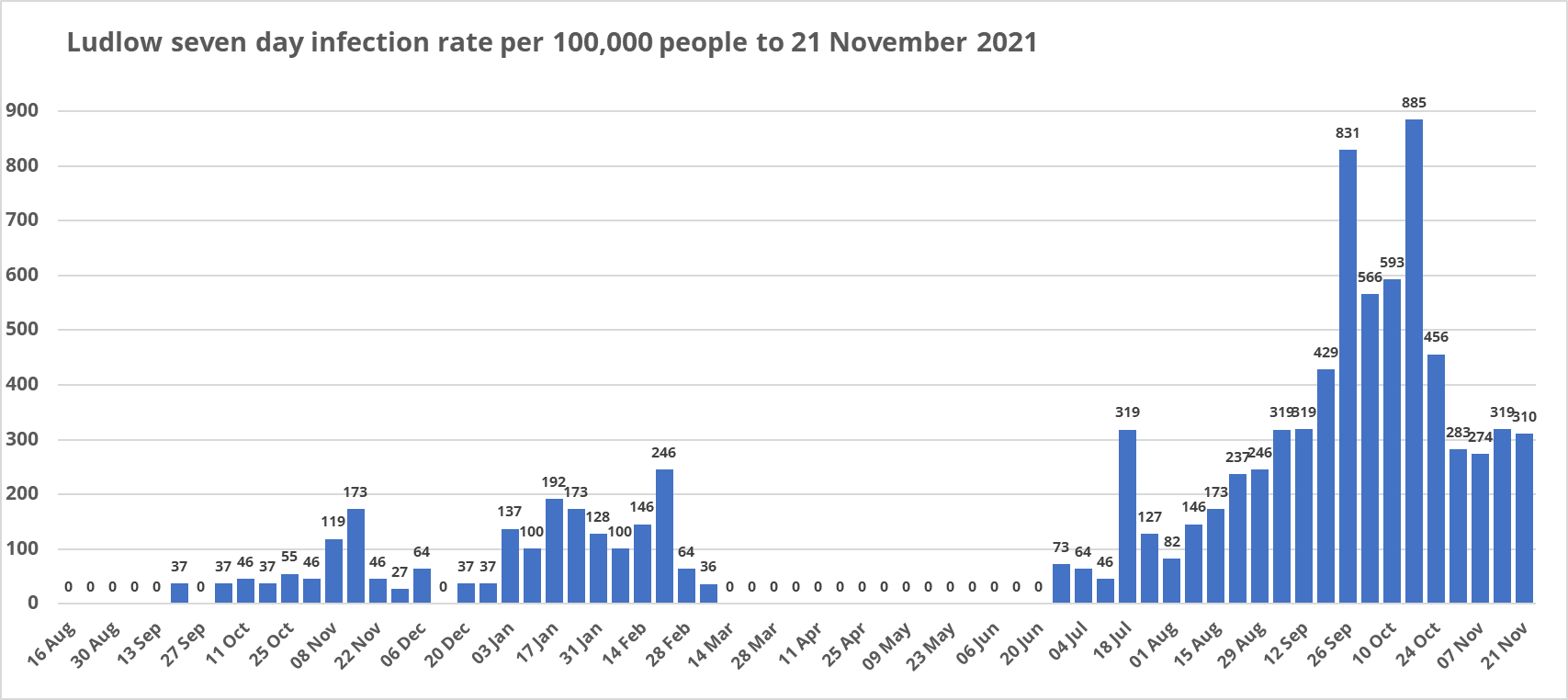Our country has been battered by Storm Arwen. Could it also be about to be battered by Variant Omicron? The new Covid variant has twice as many mutations as Delta, which is currently the dominant variant worldwide. That’s why many scientists and politicians are so concerned about it, even if we have little scientific evidence at this early stage about its transmissibility, the extent to which it can infect vaccinated people, whether it causes serious illness and whether it can compete with Delta.
Face masks will be compulsory in shops and on buses and trains from Monday. New arrivals to the UK must take PCR tests not lateral flow.
Infection rates have been increasing across Shropshire. The infection rate in the unitary area recently peaked in the seven days to 19 November at an all-time high of 571 identified cases per 100,000 people. A few days later, the infection rate reached 617 in Telford & Wrekin, though that is not quite as high as the rate a month earlier of 637.
In the last few days, the infection rate has been falling across Shropshire, Telford & Wrekin, England and the UK. It is too early to say whether this is the start of a significant downward trend or just another dip on the rollercoaster that is Covid-19.
The message from Omicron is we ain’t out of the woods yet. Those that haven’t been vaccinated, and can be vaccinated, should get themselves jabbed at the earliest opportunity. The new variant has already arrived in the UK. We may need all the protection we can get.
More than 500 children between 5 and 14 years of age are testing positive each week in the Shropshire unitary area. Across England, including Telford, peak infection is among 10 to 15 year olds. But in Shropshire 5 to 9 year olds have the same level of infection as their older peers. This may be due to outbreaks in a relatively small number of primary schools.
The success of the vaccination programme has meant that the spread of Covid-19 among older people has been limited and the impacts on their immediate and longer term health has been reduced. That means we are no longer in the most dangerous phase of the pandemic. That could change with Omicron and two cases have been in Brentwood and Nottingham. However, some scientists are optimistic that current vaccines, high vaccination rates and T-cell immunity will ensure the epidemic is not rebooted in the way it was late last year with Delta.
As citizens, we can only take personal actions.
The government updated its Covid guidance earlier this week to recommend people in England take a rapid lateral flow test before going to “high-risk settings”. That means everyday settings such as busy shopping streets or visiting vulnerable people. Many of us have been doing that for a long while.
There is a short-term shortage of lateral flow kits locally. Your best option is to order online. They usually come the next day, except Sundays.
Yesterday evening, the government imposed mask wearing in shops and on public transport, but not hospitality venues, from Monday. Travellers from outside the UK must take a PCR test not lateral flow to enable the Covid variant to be identified.
There is doubt whether people would tolerate tougher restrictions than this. Speaking before yesterday’s announcement, England’s chief medical officer Chris Whitty said:
“My greatest worry at the moment is that people… if we need to do something more muscular at some point, whether it’s for the current new variant or at some later stage, can we still take people with us?”
National and international reports suggests that the spread of Covid-19 among adults is largely among the unvaccinated. Despite the very high infection rates in Austria (65% fully vaccinated) and the Netherlands (74%) there have been protests, even riots by those opposing lockdown and, in the case of Austria, compulsory vaccination. There is a referendum on Covid restrictions in Switzerland today. There have been protests in other countries too.
Professor Stephen Reicher of SAGE said we are unlikely to see this level of unrest in the UK:
“What we’re seeing in Europe is that combination of measures which start off with coercion, and are therefore seen as illegitimate, and forms of repressive response that then turn that general discontent into open conflict.”
But there have been some protests across the UK against Covid-19 passports.
The Office of National Statistics said earlier this month that the risk of death involving COVID-19 is 32 times greater in unvaccinated people than in those who had received both doses. In the unitary area, 83% of people aged 12 or over have had two jabs, compared to 80% in England.
There are 36 patients with Covid-19 are in the Royal Shrewsbury Hospital and the Prince Royal Hospital. Around ten death certificates a week issued in Shropshire and Telford & Wrekin mention Covid-19 as a contributing or primary cause.
In the UK, all 12 to 15-year-olds are being offered a first vaccine dose. Booster doses are being rolled out, along with third doses for those with weakened immune systems. It is expected that those having had three doses will be offered a booster in the months ahead.















